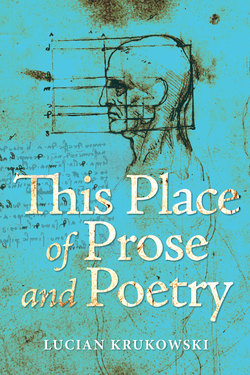Читать книгу This Place of Prose and Poetry - Lucian Krukowski - Страница 18
На сайте Литреса книга снята с продажи.
MEANING
ОглавлениеThe poet thinks, as he reads his writings: “This is what I mean to say.” But he (that poet at a later time) might say: “This is not how I would now say what I then meant to say.” How does he know? Well, the poet (as poets do) knows his mind—knows what he means as parsed by remembering and forgetting. Or should we ask someone else—a “neuro-philosopher,” say— to find out the matter of the poets meaning that is embedded in the time-slices of his brain? This version of “finding-out” makes the poet’s inspiration for the poem recoverable from an astute probing of said brain—the “original condition” of the writing of the poem (not the same, mind you, as the poem’s meaning) as it is recoverable from the brain, in which all this poetizing (despite all that distracting “mind-talk”) is taking place. This strategy, messy as it is, would then remove the gap between the physical rendering and the mental inspiration. But where, in all this, is the meaning?
What to do? If the poet did not (then) write what he wants (now) to say about it, then “intrusive, retroactive, elucidation” is one (hard) way to find out.
If, however, the poet cannot (now) write what he (then) meant to say, then the urge to write (call it creativity) is challenged by the obscurantism of memory (call it a deviance in recollection)—which is that increasing distance between the formulation of the poem and its future readings. The poet having realized this—and perhaps to spite his admirers, having willfully dropped dead—left “meanings” up to them. They, of course, will get it wrong—as he would predict. That’s why he died.
Despite the various strategies of retrieval, living memory is always incomplete: On some occasion one forgets one’s keys; on another, the ancient feeling of first-love returns unbidden. When the mind fails to recover everything the brain has putatively stored, aesthetic anguish, further introspection, and then surrender to the unescapable ineffable are in order. This is the Romantic solution.
But do the hidden links between the mind’s remembering and the brain’s storing need retrieving for the poet’s or the poem’s sake? What about us—the readers’ sake? How do we know what it is being retrieved—and for what reason? Neither mind nor brain are immune to playing tricks on us. Mind needs love, and brains want nourishment—just a friendly competition—or a difference in taste, as it is often called. Is poetic value, then, a function of the success of such retrieval—as stipulated by some or other rules of success—neurological, psychological, critical? If not, then the poet (however mind and brain work out, and whether or not “meanings” are entities to be retrieved) may not be necessary for the poetry—at all. (the modern scepticism).
Worrying this dichotomy—looking for poetic inspiration in the poet’s mind or probing for it in the brain—may be like the memories an old dog has of hunting when he is limited to chewing on an ancient bone. Some poets, however much they try to be buried in memory, are not dead-dogs in fact. Other poets are more accomodating and stay alive to join the nowadays. Then, writing-about and remembering-why, become unnecessary reaches for a talent looking for success. Focussing on the present, our new poet will brush aside retrieval, and say of the writing that it doesn’t have the inside track of Jones’s poems (Jones being a recent recipient of the “Most Promising Poet” award) but—as friends have pointed out—it has a better be-bop rhythm, and it uses more dirty words.
